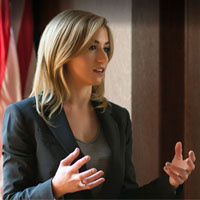 Kennett Square Misdemeanor Lawyers, Pennsylvania
Kennett Square Misdemeanor Lawyers, Pennsylvania
Sponsored Law Firm
-
 x
x

Click For More Info:
-
Ciccarelli Law Offices
Numerous Office Locations Available» view mapCriminal Defense Success Is Our Mission
You gain the resources of a Team with 100 years of combined experience fighting for their clients throughout Pennsylvania.
888-240-0896
Sponsored Lawyers
1-4 of 4 matches
Criminal, Police Misconduct, Felony, Misdemeanor, DUI-DWI
Attorney Lauren A. Wimmer has represented individuals charged in both state and federal court with charges ranging from misdemeanors like drug and various weapons offenses to felony crimes like homicide, aggravated assault, and robbery. After years of experience as the judicial law clerk to a judge in the Philadelphia Court of Common Pleas, Criminal Trial Division (Homicide), Lauren A. Wimmer developed a complete understanding of how the system works, what tactics the prosecuting attorney may use to put you behind bars, and what weaknesses to look for in physical evidence and witness testimony against you. Attorney Lauren Wimmer is a tireless and successful advocate – let her fight for you. Lauren A. Wimmer earned her law degree from Rutgers University School of Law – Camden, where she was the Managing Articles Editor for the Rutgers Journal of Law & Public Policy, President of the Women’s Law Caucus, and co-chair of the Mary Philbrook Public Interest Awards. During law school, Ms. Wimmer worked as an extern in the United States Attorney’s Office for the Eastern District of Pennsylvania and as a Legal Services Coordinator for Philadelphia Volunteer Lawyers for the Arts. She was awarded “Best Brief” in the Judge James Hunter III Moot Court Competition and served as the research assistant to Professor J.C. Lore, Director of Trial Advocacy and co-author of one of the country’s leading books on trial advocacy. Upon graduation, Ms. Wimmer earned the National Association of Women Lawyers Award and the Pro Bono Publico Award. Ms. Wimmer is licensed to practice law in Pennsylvania and New Jersey. She is a member of the National Organization for the Reform of Marijuana Laws (NORML), the Pennsylvania and New Jersey State Bar Associations, the Philadelphia Bar Association, the Pennsylvania Association of Criminal Defense Lawyers (PACDL), and the Association of Criminal Defense Lawyers of New Jersey (ACDL-NJ).
(more)Criminal, Personal Injury, Police Misconduct, Misdemeanor



 Lee Ciccarelli West Chester, PA
Lee Ciccarelli West Chester, PA AboutCiccarelli Law Offices
AboutCiccarelli Law Offices Practice AreasSpecializations
Practice AreasSpecializations


